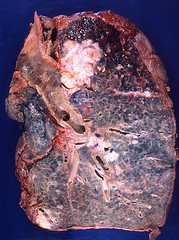 A recent study suggests that people who experience a sleep disorder called obstructive sleep apnea could get rid of the condition through losing a considerable amount of weight.
A recent study suggests that people who experience a sleep disorder called obstructive sleep apnea could get rid of the condition through losing a considerable amount of weight.
Most of the individuals with sleep apnea do not realize that they wake up several times durring the night as they breathe difficultly. Sleep apnea is a condition that could lead to severe tiredness during daytime, as well as other symptoms.
Usually, patients with this condition undergo a treatment called continuous positive airway pressure or CPAP, which utilizes a machine to maintain their airways open while sleeping.
Dr. Virend Somers, a professor of medicine and cardiovascular diseases at the Mayo Clinic in Minnesota said that there appears to be a link between excess weight and sleep apnea. However, the exact relationship is not yet clear. Somers said majority of the obese patients have sleep apnea, but not all patients with sleep apnea are obese.
Somers, who is not involved with the recent study, noted that physicians know that when patients gain additional weight, sleep apnea symptoms worsen. Meanwhile, weight lose improves the symptoms. He suggested that excessive weight may affect the ability of the airway to keep open while sleeping, or that additional fat cells could affect how the brain controls the airway.
The new study, which is published June 1 in bmj.com, is carried out by researchers headed by Kari Johansson from Karolinska Institute located in Stockholm. Researchers followed 63 overweight men, from 30 to 65-years-old, who were suffering from sleep apnea.
Fifty-eight males completed a weight plan, which followed a nine-week low-calorie diet and year-long weight maintenance program. A year after the program, nearly fifty-percent of the patients who reduced weight no longer required a CPAP machine. Ten-percent of them no longer had sleep apnea.

 Women who were obese or overweight before and after being diagnosed with breast cancer have lower odds of surviving the disease, a recent study suggests.
Women who were obese or overweight before and after being diagnosed with breast cancer have lower odds of surviving the disease, a recent study suggests. When the news that excessive cellphone use may cause brain cancer spread like wildfire across the globe, the United States public welcomed it without merely a shrug of the shoulder. The announcement, or rather the warning was given by the World Health Organization.
When the news that excessive cellphone use may cause brain cancer spread like wildfire across the globe, the United States public welcomed it without merely a shrug of the shoulder. The announcement, or rather the warning was given by the World Health Organization. A recent research study suggests that extending chemo therapy sessions for lung cancer patients will delay the return of the cancer. The current practice is to give patients with advance lung cancer four courses of two chemotherapy medications and wait until it returns.
A recent research study suggests that extending chemo therapy sessions for lung cancer patients will delay the return of the cancer. The current practice is to give patients with advance lung cancer four courses of two chemotherapy medications and wait until it returns. The Centers for Disease Control and Prevention encourages everyone to get repeat flu shots for the coming flu seasons. However, vaccine makers suggest that some people may not necessarily need another flu vaccine this year.
The Centers for Disease Control and Prevention encourages everyone to get repeat flu shots for the coming flu seasons. However, vaccine makers suggest that some people may not necessarily need another flu vaccine this year. Women who are taking blood pressure medications while diagnosed with breast cancer may have increased chances of fighting off the disease, according to two recent studies.
Women who are taking blood pressure medications while diagnosed with breast cancer may have increased chances of fighting off the disease, according to two recent studies. A recent research study revealed that children with Attention Deficit Hyperactivity Disorder (ADHD) are more likely to have problems with substance abuse – including drugs, alcohol, and cigarette – when they grow up.
A recent research study revealed that children with Attention Deficit Hyperactivity Disorder (ADHD) are more likely to have problems with substance abuse – including drugs, alcohol, and cigarette – when they grow up. Radiation emitted from a mobile phones is “possibly carcinogenic” and may cause a certain type of brain cancer called glioma, says the International Agency for Research on Cancer or IARC, which is under the World Health Organization.
Radiation emitted from a mobile phones is “possibly carcinogenic” and may cause a certain type of brain cancer called glioma, says the International Agency for Research on Cancer or IARC, which is under the World Health Organization. The bacterial outbreak, which killed at least 17 people and sickened thousands more, has sparked a diplomatic argument between two European countries.
The bacterial outbreak, which killed at least 17 people and sickened thousands more, has sparked a diplomatic argument between two European countries. Republican members of the House are pushing back against the administration’s efforts to promote healthy eating habits among the youth. They said that the Agricultural Department should tweak the rules they issued on January of this year that forces schools to make healthier lunches. Republicans insist that the ruling is far too costly.
Republican members of the House are pushing back against the administration’s efforts to promote healthy eating habits among the youth. They said that the Agricultural Department should tweak the rules they issued on January of this year that forces schools to make healthier lunches. Republicans insist that the ruling is far too costly.